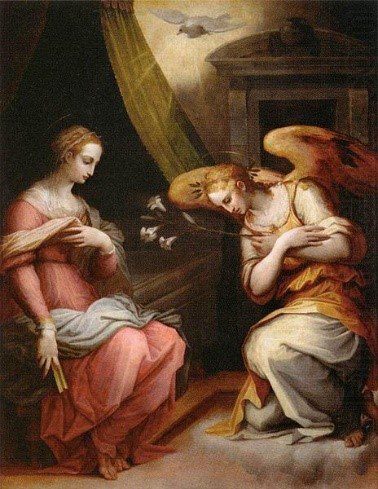“Hail, Full of Grace”
Let us begin our reflections on the Blessed Mother with the first words spoken to her in Sacred Scripture. We read in chapter one of Luke’s Gospel that the Angel Gabriel was sent to Nazareth to a virgin named Mary. When he arrives, he greets the young maiden with the following words: “Hail, full of grace!” (Lk. 1:28). There are several topics to be considered from this single phrase. Firstly, we must appreciate the speaker. The person saying these words is not some random guy. It is an angel! The word angel comes from the Greek word ággelos which literally means “messenger.” In ancient times, the ággelos of a king or aristocrat was received as the personal embodiment of the individual they represented. They did not come to speak their own opinion; they were expressly sharing the thoughts and feelings of their master. The words of Gabriel are not his words, but God’s words. The angel is simply a messenger of what he has been told to speak. When Gabriel says, “Hail!” (Χαῖρε) Mary, a salutation of profound honor reserved for royalty, it is God saying these words. Thus, we find the source and origin of Marian veneration: God Himself. Catholics did not invent honoring the Blessed Virgin Mary… God did. We simply seek to be obedient to the reverence we have observed from our Lord. It is also interesting to note that the conjugation of the Greek word used in Luke 1:28 is employed only four other times in the New Testament. Each of these usages are associated with Christ’s Passion particularly when the guards are mocking Jesus’ kingship saying “Hail! (Χαῖρε), King of the Jews” (c.f. Matt. 27:29, Mk. 15:18 & Jn. 19:3). This is a beautiful theological connection. From the moment the Angel Gabriel meets Mary of Nazareth, her life is intricately bound to the Passion and Death of her beloved Son. The full ramifications of this connection will be discussed in later articles. Let us close with one last point. What does “full of grace” mean? The Greek word for “full of grace” is kecharitōmenē (try saying that ten times fast). Literally it means “you who were created to be graced.” Yes, this is who Mary truly is…the one whom God created to be graced; the pure tabernacle He created to bear the greatest treasure of all, His only-begotten Son.


